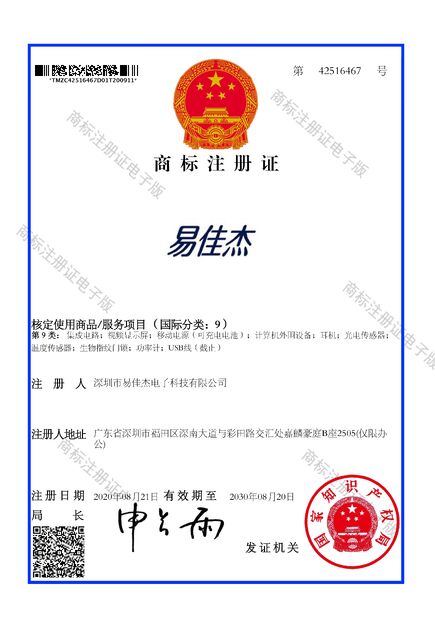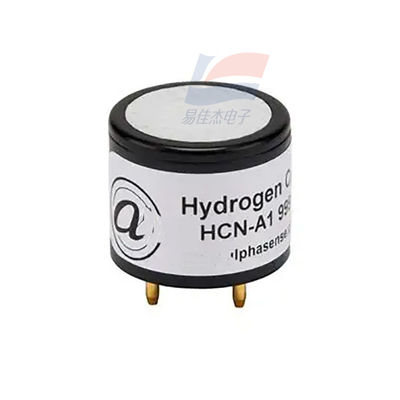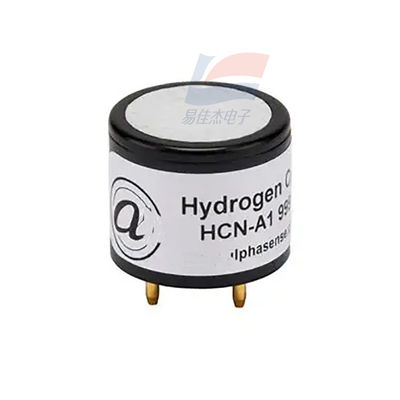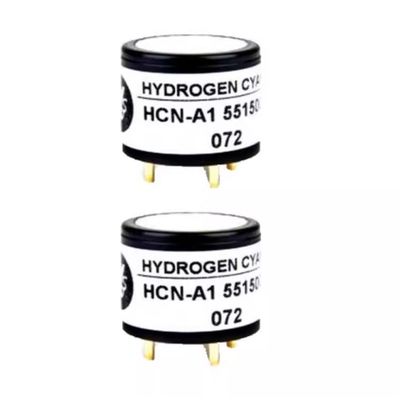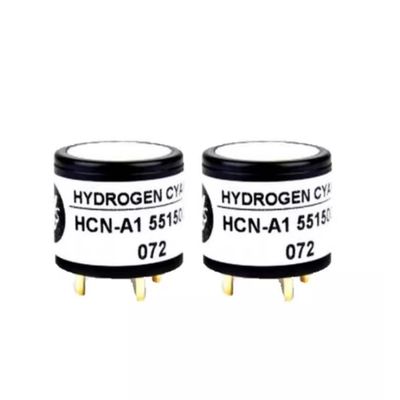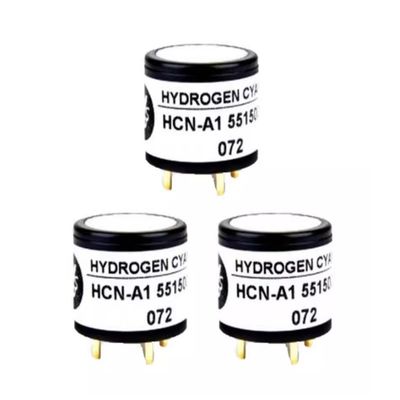Product Description:
YJJ HCN-A1 Hydrogen Cyanide Gas Sensor Is Used For Industrial Safety Purposes
Features:
HCN-A1 is an electrochemical hydrogen cyanide (HCN) gas sensor developed by Alphasense Company in the UK. It is specifically designed for the detection of highly toxic HCN gas leaks and features high sensitivity, high resolution, and strong anti-interference capabilities. It is widely used in scenarios where strict monitoring of HCN concentration is required, such as in chemical, mining, metallurgy, and environmental protection industries. Here is a detailed parameter description of it:
1. Core Detection Performance Parameters
(1) Basic Measurement Parameters
Detection gas type: Hydrogen cyanide (HCN), dedicated for the detection of highly toxic gases.
Measurement range: The guaranteed range is 0-100 ppm, meeting the requirements for routine leakage monitoring and over-limit warning.
Overload Capacity: The maximum stable response to gas pulses is 150 ppm, and it can still work normally after short-term exposure to high-concentration gas.
Sensitivity: In a 30 ppm HCN environment, the sensitivity is 45-85 nA/ppm (typical value 55-85 nA/ppm). Some channels mark 60-80 nA/ppm, but the actual value is based on the factory calibration of the sensor.
Response Time (T90): From zero point to 30 ppm HCN concentration, the response time is less than 70 seconds. Some batches can reach less than 45 seconds, quickly capturing concentration changes.
Resolution: Less than 0.05 ppm (RMS noise equivalent concentration), capable of accurately identifying low-concentration minor leaks.
Linearity: Within the 0-40 ppm concentration range, the linearity performance is good, with a full-scale error of 4-8 ppm, ensuring the detection accuracy in the low-concentration range.
Zero Point Current: In zero-point air, the zero-point current equivalent concentration is less than ±2 ppm, with small zero-point drift and strong long-term stability.
(2) Anti-interference Performance
It has low cross-sensitivity to various common gases and outstanding anti-interference capabilities:
The sensitivity to NO (50 ppm), CO (400 ppm), H2 (400 ppm), C2H4 (80 ppm), NH3 (20 ppm), CO2 (5%) is less than 0.1% - 1%;
The instantaneous sensitivity to SO2 (20 ppm) is less than 10%, to Cl2 (10 ppm) is less than -12%, to NO2 (10 ppm) is less than -180%, to H2S (20 ppm) is less than 300%. In practical applications, high-concentration interfering gases should be avoided based on the specific scenario.
2. Environmental Adaptation Parameters
Operating Temperature: -30 - 50 ℃, suitable for high and low temperature industrial scenarios and outdoor environments, maintaining stable performance even in extreme temperatures.
Operating Humidity: 15% - 90% RH (no condensation), suitable for humid workshops, underground mines, etc., adaptable to various humidity environments.
Operating Pressure: 80 - 120 kPa, suitable for normal atmospheric pressure and slight pressure fluctuation environments, no need for additional pressure compensation devices.
Temperature Dependence:
Sensitivity at -20 ℃ is 75% - 95% of that at 20 ℃;
Sensitivity at 50 ℃ is 105% - 120% of that at 20 ℃;
Zero Point Offset: The change from -20 ℃ to 20 ℃ is 0 - 1 ppm, and the change at 50 ℃ is less than ±1 ppm. The temperature influence is controllable.
(1) Electrical Parameters
Working Principle: Electrochemical sensing technology, outputting a linear analog current signal, facilitating connection with gas detection instruments and data acquisition modules.
Bias Voltage Requirement: No additional bias voltage is required, simplifying circuit design and installation procedures.
Load Resistance: Recommended value 10 - 33 Ω, matching the resistance required by the accompanying equipment to ensure stable signals.
(2) Physical Parameters Size specification: Φ20.2 × 16.5 mm (diameter × height), belonging to the 4 series size, compact structure, suitable for the installation interface of most gas detection devices.
Weight: < 6 g, lightweight design, facilitating equipment integration and portable installation.
Appearance characteristics: With a sensing area (Sensing area), avoid blocking the 0.7 mm concave groove area to ensure normal gas contact with the sensing element.
V. Lifespan and Storage Parameters
Working lifespan: Under normal working conditions, the lifespan before the output signal drops to 80% of the original signal is > 12 months. The official provides a 12-month warranty.
Drift characteristics: In the laboratory environment, the zero drift and sensitivity drift annual variation is not clearly marked (ND), and it is recommended to calibrate regularly to ensure accuracy in actual use.
Storage conditions: Need to be stored in a sealed container at 3~20 ℃, with a storage period of 6 months. After the storage period, recalibration is required before use.
VI. Core Features and Application Scenarios
(1) Core Advantages
Special detection of highly toxic HCN gas, with range, sensitivity and resolution adapted to the requirements of low-concentration leakage monitoring, ensuring personnel safety;
Electrochemical principle has strong stability, small zero drift, excellent linearity, and precise and reliable detection data;
Outstanding anti-interference ability, almost unaffected by common industrial gases, suitable for complex gas environments;
No bias voltage required, compact structure, light weight, easy to integrate into portable or fixed gas detection devices;
Wide temperature and humidity working range and good overload capacity, suitable for long-term use in harsh industrial scenarios.
(2) Typical Applications
Chemical industry: HCN leakage monitoring in cyanide production, electroplating, metallurgy and other process sections;
Mining: Gas safety detection in gold mining and other cyanide-containing mineral processing processes;
Environmental protection field: HCN concentration monitoring in industrial exhaust gas and evaluation of treatment effect;
Confined space: Safety detection before operations in underground tunnels, reaction vessels, storage tanks, etc.;
Emergency rescue: Rapid HCN concentration detection and risk assessment in chemical accidents, leakage incidents.
Specifications:
| range |
0-100PPM |
| response time |
<15s |
| Pressure range |
0.5-2Bar |
| output |
9-13mV |
| Measuring principle |
Bias, electrochemistry |


 Your message must be between 20-3,000 characters!
Your message must be between 20-3,000 characters! Please check your E-mail!
Please check your E-mail!  Your message must be between 20-3,000 characters!
Your message must be between 20-3,000 characters! Please check your E-mail!
Please check your E-mail! 
